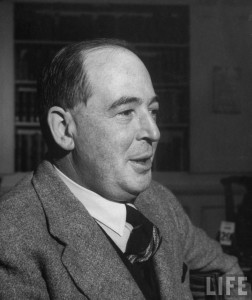 C. S. Lewis often protested that he had no interest in or taste for politics. What he really meant by that was the type of politics he imbibed growing up in a Belfast suburb, listening to his father discuss with friends the nature of the local and national politics of his Irish/English homeland. Was it the pettiness that turned him against political discussion or the boredom he suffered from those overheard conversations? Whatever the cause, he normally abhorred purely political discussions.
C. S. Lewis often protested that he had no interest in or taste for politics. What he really meant by that was the type of politics he imbibed growing up in a Belfast suburb, listening to his father discuss with friends the nature of the local and national politics of his Irish/English homeland. Was it the pettiness that turned him against political discussion or the boredom he suffered from those overheard conversations? Whatever the cause, he normally abhorred purely political discussions.
Yet there is a clear distinction that must be drawn between politics per se and the principles of governing a civil society. That second topic interested Lewis considerably, and he commented often, both in his published works and in letters, particularly to Americans, on the subject of government. He was quite direct in his statements on the tendency of civil government to take upon itself too much power over individuals’ lives.
Lewis’s 1937 novel, Out of the Silent Planet, is arguably his first foray into commentary on an elite that seeks to use science and government to attain absolute control over a society, but it’s not until the 1940s that he begins to stress that theme more frequently.
For instance, in his 1943 essay, “The Poison of Subjectivism,” he takes aim at a self-appointed societal leadership that wants to plan everyone’s lives minutely. “Many a popular ‘planner’ on a democratic platform, many a mild-eyed scientist in a democratic laboratory means, in the last resort, just what the Fascist means,” Lewis opined. “He believes that ‘good’ means whatever men are conditioned to approve. He believes that it is the function of him and his kind to condition men; to create consciences by eugenics, psychological manipulation of infants, state education and mass propaganda.”
In that same essay, he critiques the qualities voters are beginning to look for in political leaders: vision, dynamism, and creativity. Instead, he urges that we turn from a government-created “good” and return to God’s absolutes. In doing so, we would then value more highly
virtue, knowledge, diligence, and skill.” He concludes, “Give me a man who will do a day’s work for a day’s pay, who will refuse bribes, who will not make up his facts, and who has learned his job.”
The preceding comments come from the paper I presented at the C. S. Lewis Foundation’s retreat last weekend. For the next few Saturdays I’ll continue to share thoughts from that paper.
